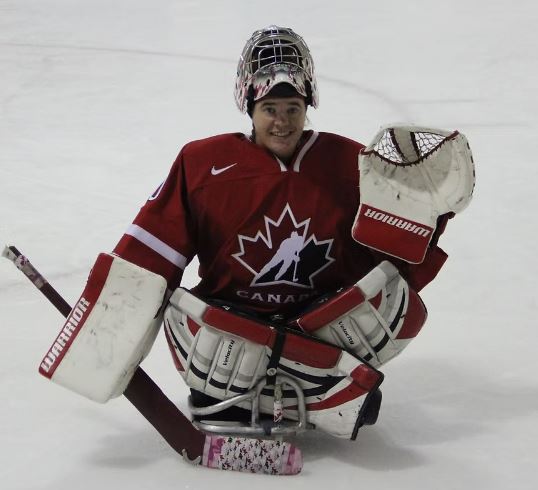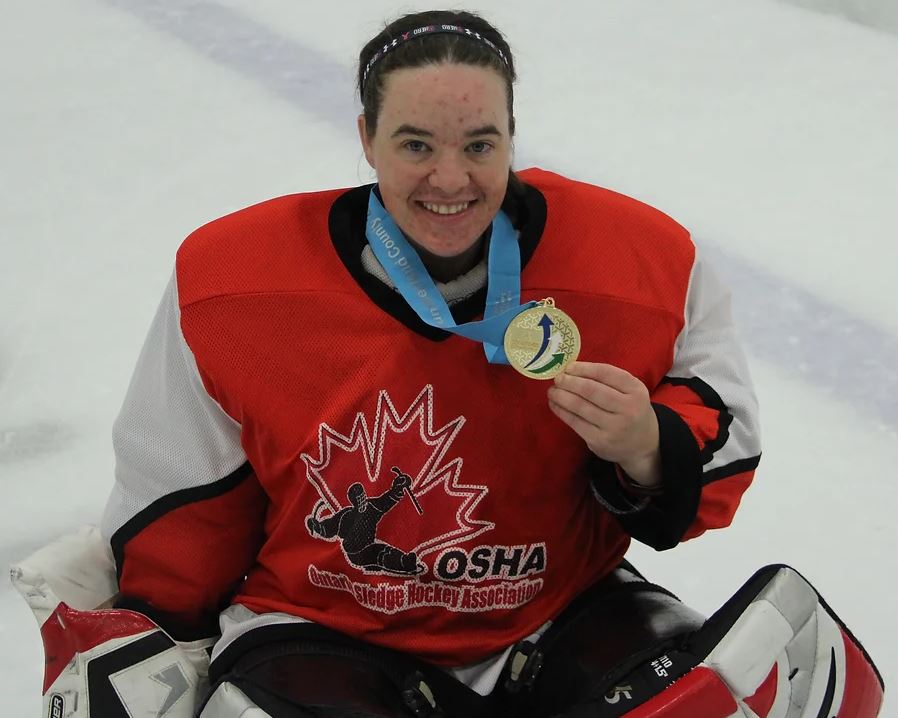Since discovering para ice hockey in 2011, Jessie Gregory has been dedicated to the sport, playing on various club teams and suiting up for team Canada on many occasions.
Gregory, who grew up in Brantford, and played many sports including baseball, hockey, soccer, and figure skating, would gravitate to para ice hockey after a spinal cord injury she sustained from a car accident in 2008.
“I went with my niece to her hockey game and happened to see some para hockey players at the local rink, and I was fascinated by it. This was right after my accident. Some of the players came up to me and talked to me…they would then ask me to try out for their team…I would [and I remember when] I got on ice that first time, it was hard. Yet, it was the best feeling ever,” Gregory recalled. “After the accident, I felt I couldn’t do much when it came to sports…and para ice hockey gave me a chance to be free and capture a feeling I was missing when I competed before. The first year was a little bit of a struggle…like learning how to play differently on the sled than stand up. [But] I just fell in love with the sport, and I quickly progressed from there.”
Gregory quickly adapted to the sport and even made it as goalie for Team Canada.
“I didn’t expect to get invited to try out, because I literally just started that season…I came in partway through the season…and had the mindset that I was still learning and trying to have fun. Making it to the National Team was special. It’s a different atmosphere and you have the chance to represent your country. After my injury I never expected to play hockey again, and then to get a chance to play on the national team…it was an experience I will never forget,” Gregory said. “During that first year, we went on to play against the United States Team…that was my first big competition…It was so different than playing with my home team, it’s higher pace, it’s a higher competition level…But that feeling of just being on ice and being free and competing for my country, and beating the Americans my first time playing them was one of the best things I have experienced.”
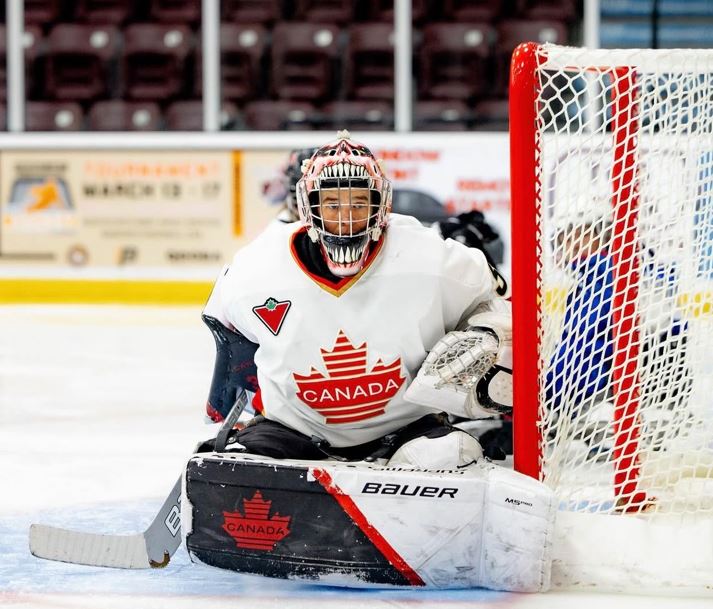
However, Gregory would capture a silver medal with Team Canada at the inaugural 2014 IPC Ice Sledge Hockey (now, para ice hockey) International Women’s Cup.
“We played the United States team in Ontario…and having family, friends there and my co-workers cheering us on was one of the best feelings. And seeing the stands full of Canadian fans…that was amazing,” she recalled. “We had a very competitive game against the American team and we really wanted to beat them, but winning silver was special.”
While Gregory continued to carve out a place with the national team, she also found success on the local level playing for the Brant County Crushers and the Niagara Thunderblades of the Ontario Sledge Hockey Association.
“We won championships during the first two years I was with the Crushers, which was another amazing experience, especially as I was just getting started in the sport. We had so much fun as a team and we played well together. We did have a few players in and out because of injuries…but we persevered. And the coaches were amazing and team support was great…as I was learning new things in the disabled world that I didn’t even know about, and how open everybody is just like that team really made me love the game,” Gregory said. “Despite the success, the Brant team would end up folding and I would go on to play for Niagara, and would end up moving into the area. They were so welcoming and so supportive. And even now, it’s like my extended family there…this year, we’re actually clicking pretty well as a team, despite struggling for a few years. Although, we weren’t winning until recently, we were still having fun and keeping positive.”
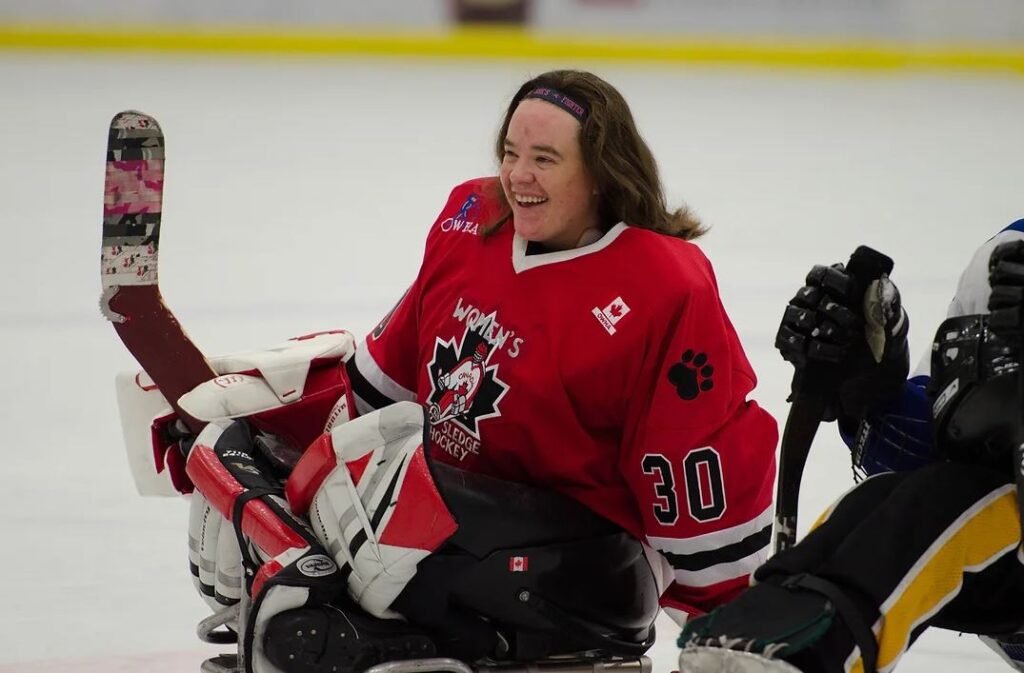
Gregory would also go on to play with and mentor Tuyet Morris-Yurczyszyn, a teammate during their time together with the Crushers and the national team.
“When she came to the team, I took on a teaching role and helped her out…At that point, I had been playing for a little bit longer than Tuyet, so just teaching her how to play helped her adjust to the game…and from there we just formed a very good relationship, and we still have a good one. Although we live far away from each other, we still communicate on a weekly basis,” she explained.
Nevertheless, the veteran goaltender had two major highlights ,including being a torch bearer for the Pan-Am games in Brantford in 2015.
“Being a torch bearer was an incredible opportunity…that feeling of all the people just cheering you on…high fiving people and enjoying the moment with them was great. And having Walter [Gretzky] there, that was so cool,” she recalled. “Another highlight was when I received the Queen Elizabeth II Diamond Jubilee Medal in 2012. I was honored and going up on stage and getting recognized…it just made me want to push harder and just keep doing as much as I could…helping people and growing our sport and teaching people about para hockey and educating people on disability in general.”
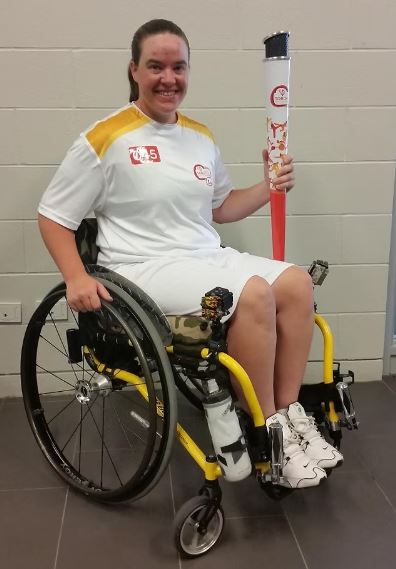
For a number of years Gregory took some time away from the sport, to focus on other things included raising her children. She would eventually return to the ice, and help Team Canada capture a pair of silver medals at the Para Ice Hockey Women’s World Challenge in 2023 and 2024.
“I was surprised when I got back on the ice for the national team and I actually did better than I ever expected. And I was a little worried I wouldn’t be playing at my full potential. So that first year was nice to get back after having my son. Unfortunately, we didn’t win, but we did really well as a team, and it was a great tournament, and the sport grew so much that year, just playing the other teams and how humble everybody was in that tournament was really nice to see,” Gregory noted. “The year after that we really improved. We have a lot of young girls on the team, so it’s a little different atmosphere this year and last year…it’s also great to see the growth in the sport in such a short period of time, especially in other countries.”
However, Gregory looks to continue to train and compete at a high level, especially on the national stage.
“My focus has been to get better through more structured training especially after the birth of my children. I’ve been improving my mental game a lot in the last like six years. This last series where we competed at ‘The Border Battle’, I had a chance to implement a lot of my mental health strategies that I’ve been working on to improve my game…you wouldn’t think that it would be a big deal, but it’s really improved my game so much just learning how to control the mental aspect when I’m on the ice and not get angry if somebody runs into me [for example],” concluded Gregory.
